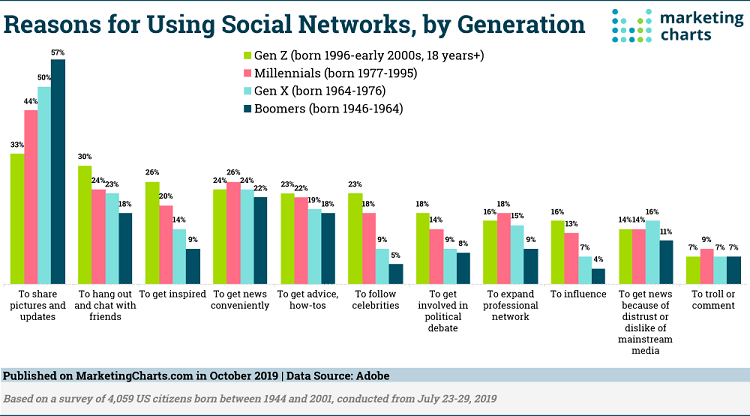Musings and rants - home
Alan's musings ... some personal views - and rants -
on this digital marketing malarkey
Why people use social media
When I saw the results of this research I just had to comment on it … mainly because it [just about] mirrors the research I conducted for my two books on the subject of marketing on social media.
The key finding is that not one of the stated reasons in this chart are commercially oriented e.g. to buy something.
Some commentators have tried to glean some marketing cheer from these results – but I think they’re clutching at digital straws.
OK, so there is odd space for a promotion of some sort – but it’s going to take some slick marketing … and by that I mean that the space is not there to be filled by a deluge of badly targeted ads programmed to be there by some software or other. And besides, that is advertising, and not any form of engagement that evangelists of social media marketing spout as being the panacea of all marketing for every organization, product or brand anywhere in the world.
Before I skim through the various categories and comment of the marketing possibilities - let’s be clear: none or the respondents said anything like; ‘to follow a brand’, or ‘to go shopping’, or ‘to find a product or service’. Interestingly, there’s nothing like ‘to complain to a brand’ or ‘seek after-sales support’ either.
To share pictures and updates: Even if you could get perfectly targeted ads on these pages, users are not in any kind of mood for being advertised at. Dubious? Try interrupting a family meal in a restaurant where the participants are passing round photos of the newest member of that family a or meeting of friends in a bar reliving old times to try and sell them something. Same principle.
To hang out and chat with friends: As above. With knobs on.
To get inspired: I suppose these folk might be open to a marketing message – if whatever inspiration they seek can be met by a product or service. But how would the seeker find your social media platform page if they don’t know what they’re looking for?
To get news conveniently: ads within the news items – but how many people even notice them let alone click on them? To be fair, apparently it’s ads in this context that helped Trump become the leader of the free world – but they simply don’t work for most [any?] other products.
To get advice, how-tos: I’m going to assume this is predominantly YouTube. Ads run before – and sometimes during – every video; anyone ever watched all the way through any of them? That said, if you sell a product that that helps solve a problem, a short promotional video might do the trick e.g. if you sell a gel that removes stains from furniture. A caveat is that YouTube is not regionalised – there’s a few times I’ve watched a video on how a product can solve my problem, only to find it’s not available in the UK.
To follow celebrities: I’ll give you this one if we consider a celebrity to be a brand. For many, ahem, celebrities, they are famous only because of their social media presence.
To get involved in political debate: yes if you’re selling a politician/political party – anything else, no. Note: comments re President Trump [above] also apply here – only more so because of the ‘bubble’ effect … but, again this likely to be advertising not ‘engagement’ marketing.
To expand professional network: I’m assuming this is LinkedIn – in which case you can market yourself, or to a lesser extent, your organization, brand or product. My caveat is that a ‘professional network’ is not really a ‘social network’.
To influence: I don’t think this refers to influencers - rather those folk who either [a] seek to build their self-esteem by, or [b] genuinely like to help people by influencing them in the ‘right’ direction e.g. health care.
To get news because of distrust or dislike of mainstream media: another category that can be confusing. Most of the news on [for example] Twitter comes from mainstream media – to seek other sources is likely to take users down the ’social bubble’ route where they follow only bias reporting and views. I suppose if you’re marketing a bias new organization … ?
To troll or comment: even though these numbers are low – I hope they mainly refer to commenting rather than trolling. Ironically, these folk might seek out commercial social media sites to abuse or comment on.
How to cite this article:
Charlesworth, A. (2019). Why people use social media. Retrieved [insert date] from AlanCharlesworth.com: https://www.alancharlesworth.com/Alans-musings/why-people-use-social-media.html

